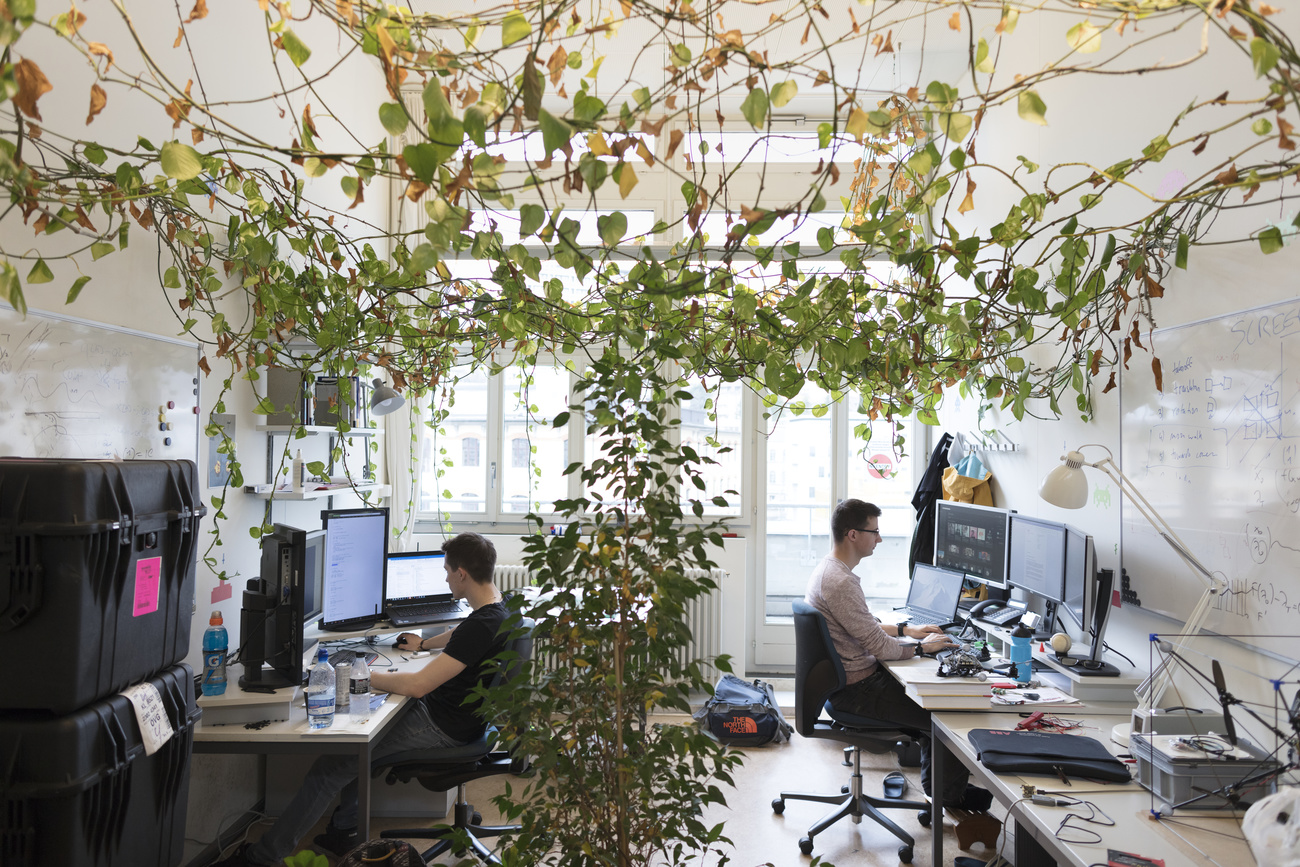
What’s on the horizon for Swiss research in Europe?

The end of talks on the framework agreement between the European Union and Switzerland has excluded the Alpine country from crucial research programmes. The Swiss government has stepped in with transitional grants for scientists and start-ups, and is forging new partnerships with countries outside the EU. Will they be enough? We look at the backlash and stakes for Switzerland in the long term.
Charlotte Laufkötter had just started university when Swiss researchers received the first funding from the European Union in 2004. Now, almost two decades later, the EU has severely limited Switzerland’s access to Horizon Europe, the largest international funding programme, making Laufkötter one of the last scientists to benefit from it.
Laufkötter, a marine scientist at the University of Bern, was awarded the prestigious Starting Grant of the European Research Council (ERC) in January this year. The grant of €1.5 million (CHF1.52 million) will help her use supercomputers and data from autonomous buoys to simulate how organic carbon sinks to the deep ocean – an important piece of research in the context of climate change.

More
Why is Horizon Europe important for Switzerland and the European Union?
When Laufkötter applied for the grant at the beginning of 2021, Switzerland was counting on the participation in Horizon Europe to fund the research; its parliament had already approved a contribution of around CHF5 billion to the CHF100 billion programme that runs until 2027.
But things changed abruptly in May 2021. After seven years of negotiations, Switzerland pulled out of talks with the EU to renew dozens of bilateral agreements on issues like migration and trade. As a result, the European Commission decided to downgrade Switzerland to a non-associated third country in the Horizon Europe programme shortly after.
Under the new status, researchers in Switzerland have been barred from applying for individual grants from the ERC. The European Commission made one exception: researchers who submitted their applications in Switzerland before the negotiations stalled could keep their grant if they move to a host institution in an EU or another eligible countryExternal link. Fierce competition for bright minds ensued. Like many others, Laufkötter was approached by EU universities offering childcare, dual career for partners, and permanent positions. The Swedish Research Council went as far as to offer awardees an extra CHF100,000External link to relocate from Switzerland to Sweden.
The importance of EU grants
As an associated country, individual researchers and companies in Switzerland could apply for EU funding, and research groups could participate in and even lead Europe-wide projects. The participation has paid off. Switzerland has gained more than it contributed, according to a 2019 report by SERIExternal link: under the Horizon 2020 programme, which ran from 2014 to 2020, Switzerland received CHF 2,7 billion in funding, placing it first among the associated countries and eighth overall.
Laufkötter found the foreign offers tempting, but ruled out moving. “My project is designed to be carried out at the University of Bern, also my partner lives in Switzerland, so I was very glad that I had the option to get backup funding,” she says. The Swiss State Secretariat for Education, Research and Innovation (SERI) has offered equivalent funding to ERC grant winners who choose to stay in Switzerland.
Horizon 2020 was the second most important public source of funding for Swiss researchers (after the Swiss National Science Foundation, SNSF), and the most important for start-ups and companies. In 2020 alone, 17 Swiss companiesExternal link received up to €2.5 million each.
At the individual level, the ERC has financed more than 800 researchers in SwitzerlandExternal link. “The advantage of an ERC grant is that it is very well known and very prestigious,” says Laufkötter. The grant is known for its high competition and strict selection process, so it can catapult careers in academia. That’s why Laufkötter will still list hers as a “badge of honour” in her CV.
SERI’s emergency measures appear to have mitigated the damage: only one awardee has so far left Switzerland to keep the Starting Grant. In March this year, SERI also offered the 26 recipients of the ECR’s latest Consolidator Grant to substitute the lost funding. The grant helps more experienced scientists to consolidate their research and team.
The SNSF has set up full replicas of the ERC grants at the national level. But in the long run, the Swiss versions may be less appealing, according to researchers contacted by SWI swissinfo.ch. More than 50% of researchers in SwitzerlandExternal link come from abroad, and the ERC grants were an important tool to attract those talents. “Without access to Horizon Europe it is becoming a challenge to appeal to brilliant minds and maintain the high quality of research within Switzerland,” says Yves Flückiger, rector at the University of Geneva and president of Swissuniversities, the umbrella organisation of higher education institutions. “We have to reinvent new forms of collaborations and new financing patterns,” he adds.
To compensate the loss of EU funding, the government has adopted transitional measures and is launching the “Swiss Accelerator” programme through the Swiss innovation agency Innosuisse this month. Nonetheless, scientists and business owners have told SWI swissinfo.ch that some start-ups are already considering opening offices in other European countries.
Quantam collaborations wanted
Besides grants for individuals and companies, international collaborations have been another cornerstone of Switzerland’s participation in EU programmes. Under Horizon 2020, Swiss research institutions, companies and non-profit organisations coordinated 1,211 projects (ca. 4% of the total) and they got the highest success rate overall, according to SERIExternal link.
This is set to change. Under the “third country” status, Swiss research groups and companies can still participate in EU-wide projects, but they can no longer lead them. “Because of that we will lose visibility, prestige, and the ability to influence big projects,” says Dimitri Konstantas from the University of Geneva. He coordinates H2020 AVENUE, a CHF22 million project that tests autonomous vehicles for public transportation in Geneva and three other European cities.
Switzerland is now missing out on crucial research, for example in the field of quantum technologies. The EU launched the Quantum FlagshipExternal link initiative in 2018, with a budget of €1 billion and the goal of developing quantum-based computing, secure data transmission, and sensor technology. Swiss partners were involved in 11 of the 24 collaborative projects of the Flagship, including many start-ups and companies. “Our collaboration ends this month. Since quantum technology is of strategic importance to the EU, we cannot even participate with our own money. We are flat out excluded!” says Andreas Wallraff from ETH Zurich.
Wallraff’s research group was working with the Swiss company Zurich Instruments and eight European partners on a superconducting quantum computer. As research moves towards the technical limits of conventional computers, quantum computing promises to solve complex problems in the next decades, such as developing new drugs or more efficient batteries.
Many countries in the world already have national programmes for quantum technologies. Germany alone is investing €2 billion in this field. Switzerland, despite being a big player, does not have a national programme yet. “To keep up with the competition, we need to invest more than before inside Switzerland, for example in huge projects like quantum research,” says Flückiger at swissuniversities. But he also cautions that national investment alone may not be enough. “Science is much more open than 30 years ago. As we saw with the Covid-19 vaccines, sharing data and creating international collaborations is key to scientific advances and to build huge infrastructures,” he adds.

More
Swiss universities warn of ‘serious consequences’ of Horizon Europe exclusion
Alliances for the future
As collaboration with Europe is hampered, Switzerland intends to revitalise strategic alliances with countries outside the EU – representatives of SERI and SNSF have recently held bilateral meetings with colleagues from the USA, Canada, Brazil, and the UK.
Strengthening networks overseas is certainly not bad, but for a country that sits at the crossroads of Europe, natural partners are all around, especially in the context of transport and mobility. “We couldn’t do the AVENUE project with other partners,” says Konstantas. “In Europe we share a similar culture of mobility that is different to the USA or Asia; problems and solutions differ too.”
More than 5,000 scientists across Europe are insisting on continued cooperation. They have signed the campaign “Stick to science”External link that calls for speedy association agreements within Horizon Europe for both Switzerland and the UK, despite ongoing political disputes. The campaign points out that Europe needs the commitment and scientific contributions of strong research-focused countries from both countries.
But since the end of the talks, the Swiss-EU relationship has become even more complicated. The Swiss government now wants to renegotiate the existing treaties, starting with the most pressing ones, including the full association for Switzerland in research – which remains a declared goal. Exploratory talks with the EU on the new approach have just begun. A quick resolution to re-integrating Switzerland in Horizon seems unlikely.
Swissuniversities calls for Switzerland to be re-associated with Horizon Europe as quickly as possible. Switzerland’s economy, innovation and research sector are booming, says Flückiger. But in the longer term, it is about much more. “In the end, it is the quality of life in Switzerland which is at stake: health, education, jobs, and progress towards sustainable development,” he says.

In compliance with the JTI standards
More: SWI swissinfo.ch certified by the Journalism Trust Initiative






























You can find an overview of ongoing debates with our journalists here . Please join us!
If you want to start a conversation about a topic raised in this article or want to report factual errors, email us at english@swissinfo.ch.